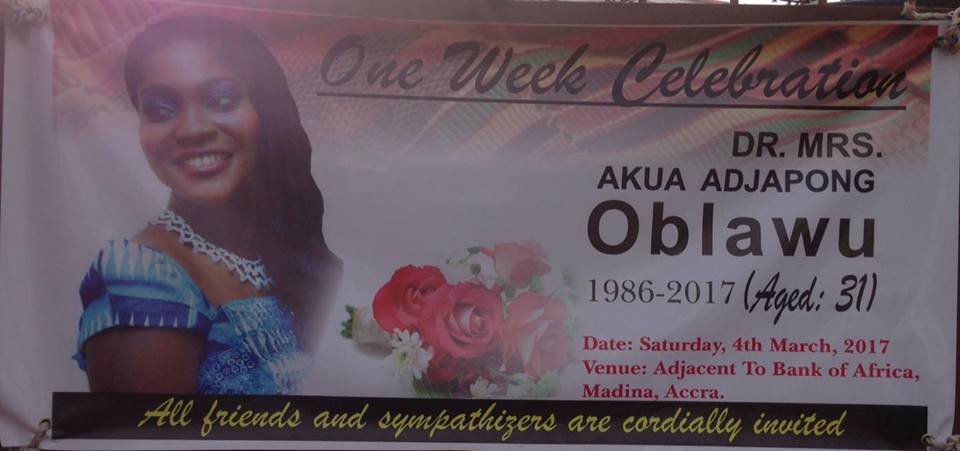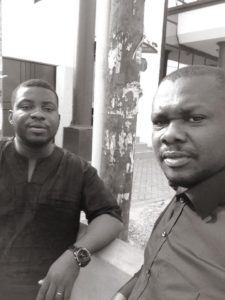WHEN LIFE DOESN’T MAKE SENSE!
In a world replete with success philosophy and prosperity preachers, how does one make sense of life when tragedy hits and one has no mental framework or faith construct to deal?
Man! February 2017 was one nasty month—humanly speaking. Tragedy upon tragedy. Within a week a friend and co-worker gets a stroke in Canada, a mentee loses her grandfather in France, another (a former international student in Belgium) loses her dad in Ghana… and then, as if these weren’t enough, the month wouldn’t end without the loss of a friend, a younger medical colleague in Ghana!
In fact, today is the ‘one-week celebration’ of the latter (picture above). Man! Akua was barely 31! I remember her beautiful countenance, not only from her internship days at the 37 Military Hospital when I was a medical officer there, but even only last November (2016) while I was in Ghana I had the joy of seeing her in her home. What had happened was that my bosom friend and brother Ben had urged me to come along with him to visit a school mate of his (and fellow church member) who had recently suffered a stroke. Prior to that I had no clue it was Akua’s home we were visiting—and that she was the young wife of Kofi. (As it turned out later, Kofi is actually the classmate of my wife, Anyele, from primary school).
My heart sank when I saw this hitherto strong young man, Kofi, wheelchair-bound and struggling to utter a few words from a seriously contorted face. This young man who was working in the insurance world had barely been married a few months when he suddenly had this stroke. Not even surgical interventions in the United Kingdom had salvaged the sad situation. Yet it was gratifying to observe his faith and how strongly supportive his young bride had been from the beginning up until the day I visited them, nursing him with love. The smart, pretty doctor now had a husband for a live-in patient.. O boy did I pray my heart and lungs out!
So imagine my shock last week. I had missed a phone call in the midst of busy travel. When I finally got to call back the conversation went something like this.
“Yaw, do you remember Kofi whom you prayed for?”
“Aha, of course.” (They say fear and faith don’t mix–well, at that moment I had both somehow.)
“Kofi’s wife just died!”
“Huh? Ben, what are you saying?”
“Yes oo, Yaw. Kofi’s wife, Akua, just died!”
“What?!!What’s going on?!” …
BRINGING IT HOME
Silence. Sadness. … Sometimes, life just doesn’t make sense and it would be interesting to hear what strictly-prosperity preachers have to say to these things. As for atheists and agnostics, I don’t know how they make it through life but for me, without God there is neither hope nor any sense to life. Yet then again, like David Bosch puts it in A Spirituality of the Road, “A god who provides all the answers becomes an explicable and comprehensible god, but also ceases to be God.” Bosch continues to share about an Albert Schweitzer (French-German physician and theologian) experience:
“Albert Schweitzer, in recollecting the ten years he taught catechism classes to boys in Strassbourg before the First World War, noted that after the war some of those young men thanked him that he had shown them so clearly that the Christian faith does not explain everything. This awareness enabled them to survive spiritually in the trenches, whereas many others, who were told that Christianity provided all the answers, lost their faith when faced with that which was inexplicable.”
But this was my shocker: the story of a piece of paper found among the ruins of the Jewish ghetto in Warsaw after the Second World War. It is said to contain the last words of a certain Jew, Jessel Rakover, as he was preparing himself for an impending violent riot aimed at the persecution and massacre of his ethnic/religious group. The portion of Bosch quotes in A Spirituality of the Road gives me the chills. Here goes:
“I believe in you, God of Israel, even if you have tried your best to dissuade me to believe in you. I believe in your laws, even if I cannot approve of the way you manage things. … I bow my head before your majesty, but I will not kiss the rod with which you hit me. … I would like to say to you that at this moment, more even than in any previous period of our eternal struggle for survival, we, the tortured, the humiliated, buried alive, burnt alive, insulted, mocked, we, murdered by million, that we have the right to know: until when are you going to allow it to continue? …I say this to you because I believe in you, more than ever before, because I know now, with absolute certainty, that you are my God, because you cannot be the God of those whose deeds are the most horrendous expression of godlessness; … I die in peace, but not appeased; persecuted, but not enslaved; embittered, but not cynical; a believer, but not pleading; a man who loves God, but does not say amen to everything. I have followed God even when he had flung me down, tortured me, and made me an object of humiliation and derision. And these are my last words to you my angry God: all this will do you no good. You have done everything possible to destroy my faith, yet I am dying precisely as I have lived, saying: ‘Shma Yishrael, hear, O Israel, the Lord is our God, one Lord.’ Into your hands, O God, I commit my spirit.”
WHAT WILL YOU DO?
Are there any more persons on earth who have such stubborn faith? Any of the Augustine stock who would say, “For it is better for them to find you and leave the question unanswered than to find the answer without finding you”?
I just got off the phone this morning with a young man who lost two of his sisters in a tragic car accident a few years ago—and their father is a world-renowned preacher who as at this very morning was still doing his Lord’s bidding in London, UK. That day, apart from the two teenage girls, four other church members lost this lives. I knew and loved those dainty girls, especially the 19-year old whom I had grown fond of since her high school days! Tell me, how many preachers have a theological framework that can contain such inexplicable tragedy?
It is easy to talk about tragic Job and weeping Jeremiah or even Jesus whose life was cut short at 33. But as the Japanese theologian Koyama challenges, “Jeremiah and Jesus place their trust in the forsaking God! There is no longer the faith built upon God’s obvious answer. They believed in God even though God did not answer! … Here we do not see an answer-theology. We see instead a relationship-theology.”
I ask again. In a world replete with success philosophy and prosperity theology, how does one make sense of life when tragedy hits and one has no mental framework or faith construct to deal with it? Who is willing to “place their trust in the forsaking God” in a ‘God-forsaken’ place? This is hard; but such is life.



